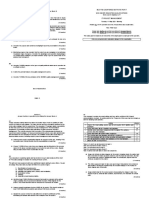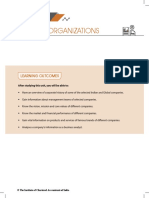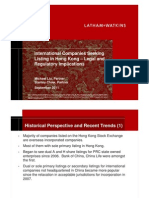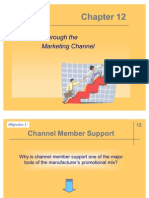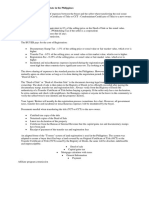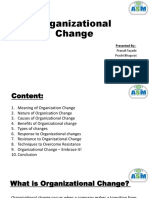0 ratings0% found this document useful (0 votes)
145 viewsApr 14 Dippm
Apr 14 Dippm
Uploaded by
Nadeem RazaThis document outlines questions for an IT project management exam. It covers topics such as:
- The purpose and components of a business case report.
- Skills and attributes of an effective IT project manager.
- Measuring quality and progress on a project.
- Change control and configuration management procedures.
- 'Go-live' strategies and acceptance testing.
- Work breakdown structures, Gantt charts, and scheduling project tasks.
The questions assess understanding of key project management concepts and ability to apply them to sample project scenarios.
Copyright:
© All Rights Reserved
Available Formats
Download as PDF, TXT or read online from Scribd
Apr 14 Dippm
Apr 14 Dippm
Uploaded by
Nadeem Raza0 ratings0% found this document useful (0 votes)
145 views4 pagesThis document outlines questions for an IT project management exam. It covers topics such as:
- The purpose and components of a business case report.
- Skills and attributes of an effective IT project manager.
- Measuring quality and progress on a project.
- Change control and configuration management procedures.
- 'Go-live' strategies and acceptance testing.
- Work breakdown structures, Gantt charts, and scheduling project tasks.
The questions assess understanding of key project management concepts and ability to apply them to sample project scenarios.
Original Description:
Paper
Original Title
apr14dippm
Copyright
© © All Rights Reserved
Available Formats
PDF, TXT or read online from Scribd
Share this document
Did you find this document useful?
Is this content inappropriate?
This document outlines questions for an IT project management exam. It covers topics such as:
- The purpose and components of a business case report.
- Skills and attributes of an effective IT project manager.
- Measuring quality and progress on a project.
- Change control and configuration management procedures.
- 'Go-live' strategies and acceptance testing.
- Work breakdown structures, Gantt charts, and scheduling project tasks.
The questions assess understanding of key project management concepts and ability to apply them to sample project scenarios.
Copyright:
© All Rights Reserved
Available Formats
Download as PDF, TXT or read online from Scribd
Download as pdf or txt
0 ratings0% found this document useful (0 votes)
145 views4 pagesApr 14 Dippm
Apr 14 Dippm
Uploaded by
Nadeem RazaThis document outlines questions for an IT project management exam. It covers topics such as:
- The purpose and components of a business case report.
- Skills and attributes of an effective IT project manager.
- Measuring quality and progress on a project.
- Change control and configuration management procedures.
- 'Go-live' strategies and acceptance testing.
- Work breakdown structures, Gantt charts, and scheduling project tasks.
The questions assess understanding of key project management concepts and ability to apply them to sample project scenarios.
Copyright:
© All Rights Reserved
Available Formats
Download as PDF, TXT or read online from Scribd
Download as pdf or txt
You are on page 1of 4
BCS THE CHARTERED INSTITUTE FOR IT
BCS HIGHER EDUCATION QUALIFICATIONS
BCS Level 5 Diploma in IT
IT PROJECT MANAGEMENT
Thursday 3
rd
April 2014 Morning
Time: TWO hours
Answer any FOUR questions out of SIX. All questions carry equal marks
Answer any Section A questions you attempt in Answer Book A
Answer any Section B questions you attempt in Answer Book B
The marks given in brackets are indicative of the weight given to each part of the question.
Only non-programmable calculators are allowed in this examination.
Section A
Answer Section A questions in Answer Book A
A1
a) What are the reasons for producing a business case report?
(6 marks)
b) Describe FIVE components of a business case.
(10 marks)
c) The business case must be agreed and signed off in the project initiation stage.
Give TWO situations where the business case can be used later in the project.
(6 marks)
d) Who is responsible for establishing and monitoring the business case for a project?
(3 marks)
A2
a) Good IT project managers are expected to possess certain skills (things they can do) or
attributes (characteristics they possess). Describe FOUR skills/attributes of good IT
project managers.
(8 marks)
b) IT project managers adopt a number of management styles. Choose one and describe
its main features.
(10 marks)
c) An IT project has been running well for 6 months. The IT project manager then notices a
decrease in the efficiency and performance of the project team. Describe the steps they
could take to deal with this situation.
(7 marks)
Turn Over]
A3
a) How is quality measured on a project? (13 marks)
b) "If 50% of the deliverables of a project meet their quality standards then the project is
50% complete."
i) Decide if this statement true or false and explain your choice.
ii) Identity important factors not mentioned in the statement that a project manager
should consider when assessing how well a project is progressing.
(12 marks)
Section B
Answer Section B questions in Answer Book B
B4
You work for a small organisation that has just set up an IT department in order to develop a
new database system in-house. You have been appointed project manager.
a) Write a memorandum to the managing director explaining the need for:
i) change control,
ii) configuration management.
Highlight at least TWO benefits and ONE disadvantage of each.
(12 marks)
b) List SIX different roles that need to be carried out by people involved in handling and
implementing a request for change within the proposed change control procedure. For
each of these six roles identify clearly their specific responsibilities relating to the
request for change.
(9 marks)
c) Name and describe briefly the TWO major elements of a configuration management
system.
(4 marks)
B5
a) Identify and describe briefly THREE types of go-live strategy that could be used on a
project.
(9 marks)
b) Documentation is often overlooked at installation. List FOUR important documents that
will be handed over at go-live.
(4 marks)
c) Before any system can go-live it must be acceptance tested by the users. List THREE
different areas that are covered during acceptance testing.
(3 marks)
d) Describe THREE ways in which the success of a system can be measured after it has
become operational.
(9 marks)
Turn Over]
B6
Your company is expanding rapidly and has decided to buy in and install an off-the-shelf
(OTS) ledger package to replace the existing manual system. This will need new equipment
and network cabling throughout the offices. You are to manage this project. You have drawn
up an outline project plan to include the following main tasks:
A. Interview accounts staff, draw up and agree a list of main
requirements
6 weeks
B. Assess alternative O-T-S packages and select the most appropriate. 6 weeks
C. Specify and order all the required new hardware and communications. 3 weeks
D. Test and install all the new hardware and equipment. 9 weeks
E. Modify and test the package software. 15 weeks
F. Install the package software 1 week
G. Specify & obtain the accounts data required to implement the system 6 weeks
H. Draw up a training plan. 3 week
I. Train the users 9 weeks
J. Draw up an acceptance test plan test 3 week
K . Acceptance testing 4 weeks
L. Load data and implement the new system. 3 week
a) Draw a work breakdown structure (WBS) diagram for the project, showing all the
planned tasks. This WBS should contain at least two levels.
(4 marks)
b) Explain the main differences between this WBS and a product breakdown structure
(PBS) diagram for the same project.
(3 marks)
c) The dependencies between the 10 tasks listed above are:
B depends on A
C, E, H and J all depend on B
D depends on C
F depends on D and E
G depends on E
I depends on H
K depends on F, I and J
L depends on G and K
Draw a full Gantt chart for the project, to show all dependencies, float and highlighting
the critical path
(10 marks)
d) At the end of week 24, tasks A, B, C, D, H, I and J have been completed on schedule,
and task E is continuing on schedule. However it is realised that task F will now take 3
weeks, starting from week 28.
Re-draw the Gantt chart to reflect this progress to date, making any necessary changes,
and highlight the critical path.
(8 marks)
You might also like
- CH 31 Open-Economy Macroeconomics Basic ConceptsDocument52 pagesCH 31 Open-Economy Macroeconomics Basic ConceptsveroirenNo ratings yet
- The Bcs Professional Examinations BCS Level 5 Diploma in IT April 2008 Examiners' Report IT Project ManagementDocument12 pagesThe Bcs Professional Examinations BCS Level 5 Diploma in IT April 2008 Examiners' Report IT Project ManagementOzioma Ihekwoaba100% (1)
- Sample QuestionDocument2 pagesSample QuestionSACHIN RANA CHHETRI100% (1)
- Shanti Business School: PGDM Trimester-Iii End Term Examination JULY - 2015Document8 pagesShanti Business School: PGDM Trimester-Iii End Term Examination JULY - 2015SharmaNo ratings yet
- Bcs Higher Education Qualifications BCS Level 6 Professional Graduate Diploma in ITDocument2 pagesBcs Higher Education Qualifications BCS Level 6 Professional Graduate Diploma in ITRonald Nyathi100% (1)
- 2021may Dip PM NewDocument6 pages2021may Dip PM Newcojena1466No ratings yet
- 2023apr Dip PM NewDocument6 pages2023apr Dip PM Newcojena1466No ratings yet
- Section B Answer Section B Questions You Attempt in Answer Book BDocument2 pagesSection B Answer Section B Questions You Attempt in Answer Book BASHEHU SANINo ratings yet
- PM1819MDocument4 pagesPM1819MAkhilesh MandalNo ratings yet
- Oct 06 DippmDocument2 pagesOct 06 DippmAgboola Ayobami AbiolaNo ratings yet
- PM1920 MsDocument2 pagesPM1920 MsAkhilesh MandalNo ratings yet
- Tybsc-It Sem5 SPM Apr19Document2 pagesTybsc-It Sem5 SPM Apr19Nishant SawantNo ratings yet
- PM1415MDocument6 pagesPM1415MBin SaadunNo ratings yet
- Ce 41 Ce 401 2021Document3 pagesCe 41 Ce 401 2021Anvari RahmanNo ratings yet
- SPM Apr-19Document2 pagesSPM Apr-19Sumedh JadhavNo ratings yet
- The Bcs Professional Examinations BCS Level 5 Diploma in IT October 2009 Examiners' Report IT Project Management Section ADocument10 pagesThe Bcs Professional Examinations BCS Level 5 Diploma in IT October 2009 Examiners' Report IT Project Management Section AOzioma IhekwoabaNo ratings yet
- Term End Examination - May 2013 Course: MEE239 - Project Management Slot: B1+TB1 Class NBR: 1081 Time: Three Hours Max - Marks:100 PART - A (10 X 4 40 Marks) Answer ALL QuestionsDocument0 pagesTerm End Examination - May 2013 Course: MEE239 - Project Management Slot: B1+TB1 Class NBR: 1081 Time: Three Hours Max - Marks:100 PART - A (10 X 4 40 Marks) Answer ALL QuestionsSahil GuptaNo ratings yet
- Typical Examination Questions Question 1 You Have Been Asked To Lead A Project To Develop A Teaching Facility ForDocument2 pagesTypical Examination Questions Question 1 You Have Been Asked To Lead A Project To Develop A Teaching Facility ForVarun JamesNo ratings yet
- Documents: IT4203: IT Project ManagementDocument8 pagesDocuments: IT4203: IT Project ManagementsathyatrueNo ratings yet
- 2022oct Dip PM NewDocument6 pages2022oct Dip PM Newcojena1466No ratings yet
- CH 10Document7 pagesCH 10Witness Wii MujoroNo ratings yet
- E1 May 2011 QueDocument12 pagesE1 May 2011 Quepatrick phiriNo ratings yet
- Software Project Management Noe 77Document2 pagesSoftware Project Management Noe 77aditya.k.singh1212No ratings yet
- Mba MB 401 Project Management and Entrepreneurship Development 2011Document7 pagesMba MB 401 Project Management and Entrepreneurship Development 2011RajeshNo ratings yet
- M.B.A. Degree Examination, May 2021: (Human Resource Management)Document2 pagesM.B.A. Degree Examination, May 2021: (Human Resource Management)Umashankar GiriNo ratings yet
- HBC 2404 Project ManagementDocument2 pagesHBC 2404 Project Managementgesarevivian21No ratings yet
- Question - Project Management July-Dis 2011Document4 pagesQuestion - Project Management July-Dis 2011electricKKTMNo ratings yet
- Test 1Document3 pagesTest 1sheronmufunguriNo ratings yet
- Bit2305 Ict Project Management Bbit204 It Project Management BacDocument3 pagesBit2305 Ict Project Management Bbit204 It Project Management Bacgracevalerie1No ratings yet
- Bcs Higher Education Qualifications BCS Level 6 Professional Graduate Diploma in ITDocument4 pagesBcs Higher Education Qualifications BCS Level 6 Professional Graduate Diploma in ITOzioma IhekwoabaNo ratings yet
- PM Past PaperDocument2 pagesPM Past PaperŠhákéèl ßûghÿoNo ratings yet
- E2.ENMM - .L Question CMA June 2021 Exam.Document4 pagesE2.ENMM - .L Question CMA June 2021 Exam.asifNo ratings yet
- Be Winter 2022Document3 pagesBe Winter 2022fwzf2b7kkvNo ratings yet
- Subject: B. Tech (Computer Science & Engineering) Paper Name: Project Management Paper Code: HU801B FM: 70 Time: 3 HoursDocument4 pagesSubject: B. Tech (Computer Science & Engineering) Paper Name: Project Management Paper Code: HU801B FM: 70 Time: 3 HoursVikas Kumar100% (1)
- Chapter#03 Mcqs Project Management: PersonalityDocument11 pagesChapter#03 Mcqs Project Management: PersonalityIrfan GondalNo ratings yet
- NCC Education International Diploma IN Computer Studies Programming Methods March 2012 - Local ExaminationDocument4 pagesNCC Education International Diploma IN Computer Studies Programming Methods March 2012 - Local ExaminationCedric CedricNo ratings yet
- PM2223MDocument3 pagesPM2223MAkhilesh MandalNo ratings yet
- CEN312 Essay-Based CW - 042522Document7 pagesCEN312 Essay-Based CW - 042522KojiNo ratings yet
- The Bcs Professional Examinations BCS Level 4 Certificate in ITDocument4 pagesThe Bcs Professional Examinations BCS Level 4 Certificate in ITAbiodun AdebayoNo ratings yet
- Mid RevisionDocument6 pagesMid RevisionAhmed BeheryNo ratings yet
- Unit1imp PDFDocument3 pagesUnit1imp PDFRaju Jacob RajNo ratings yet
- Scope ManagementDocument5 pagesScope ManagementSandeep KhandelwalNo ratings yet
- QS PM 1Document8 pagesQS PM 1Súkümàr PrasadNo ratings yet
- Shanti Business School: PGDM Trimester-Iii End Term Examination JULY - 2015Document8 pagesShanti Business School: PGDM Trimester-Iii End Term Examination JULY - 2015SharmaNo ratings yet
- 1Document2 pages1Deepak GautamNo ratings yet
- Quiz 2 SYE 6010Document6 pagesQuiz 2 SYE 6010charlesNo ratings yet
- BB 4332 Project Management 1Document4 pagesBB 4332 Project Management 1farzanahrazakNo ratings yet
- QuestionsDocument26 pagesQuestionsPradeep ShindeNo ratings yet
- Soft Eng Exam1 JacintoDocument4 pagesSoft Eng Exam1 JacintoCharmel CamposoNo ratings yet
- rr322401 Industrial ManagementDocument5 pagesrr322401 Industrial ManagementSRINIVASA RAO GANTANo ratings yet
- Exam PM NOV 2022 IMavec Correction QCMDocument5 pagesExam PM NOV 2022 IMavec Correction QCMNajet KasmiNo ratings yet
- SPC 2202 Object Oriented Analysis and Design Year II Semester IDocument3 pagesSPC 2202 Object Oriented Analysis and Design Year II Semester Imawiraderic55No ratings yet
- Bcs Higher Education Qualifications BCS Level 5 Diploma in IT April 2010 Examiners' Report IT Project Management Section ADocument14 pagesBcs Higher Education Qualifications BCS Level 5 Diploma in IT April 2010 Examiners' Report IT Project Management Section AOzioma IhekwoabaNo ratings yet
- SST101e JAN 2021 TOA PDFDocument6 pagesSST101e JAN 2021 TOA PDFJulyhah JulaihahNo ratings yet
- ICT project managementDocument3 pagesICT project managementvictornziokamutuaNo ratings yet
- ENX314 Typical Exam-Type Questons and Solutions B-2Document25 pagesENX314 Typical Exam-Type Questons and Solutions B-2khairul azhar100% (1)
- Master of Business Administration - General Cohort: MBAG/13/PT Jan Examinations For 2013 - 2014 Semester II / 2014 Semester IDocument4 pagesMaster of Business Administration - General Cohort: MBAG/13/PT Jan Examinations For 2013 - 2014 Semester II / 2014 Semester ITessa MkhomoleNo ratings yet
- Salesforce Certified Platform Developer I CRT-450 Exam PreparationFrom EverandSalesforce Certified Platform Developer I CRT-450 Exam PreparationNo ratings yet
- Blue Prism Developer Certification Case Based Practice Question - Latest 2023From EverandBlue Prism Developer Certification Case Based Practice Question - Latest 2023No ratings yet
- Bcs The Chartered Institute For ItDocument2 pagesBcs The Chartered Institute For ItNadeem RazaNo ratings yet
- Bcs The Chartered Institute For ItDocument12 pagesBcs The Chartered Institute For ItNadeem RazaNo ratings yet
- Mar 12 DipuidreportDocument10 pagesMar 12 DipuidreportNadeem RazaNo ratings yet
- Introduction To The World of Computers: The Association of Business Executives Certifi Cate 2.2 IWCDocument8 pagesIntroduction To The World of Computers: The Association of Business Executives Certifi Cate 2.2 IWCNadeem RazaNo ratings yet
- 1 1IBnDocument12 pages1 1IBnNadeem RazaNo ratings yet
- Exams Mar14 TimetableDocument1 pageExams Mar14 TimetableNadeem RazaNo ratings yet
- Diploma in IT Syllabus: Principles of User Interface DesignDocument3 pagesDiploma in IT Syllabus: Principles of User Interface DesignNadeem RazaNo ratings yet
- Media Playing Vital Role in Strengthening Democracy: Kaira: Thursday, 18 October 2012 21:24 Posted by Asad Naeem 442Document2 pagesMedia Playing Vital Role in Strengthening Democracy: Kaira: Thursday, 18 October 2012 21:24 Posted by Asad Naeem 442Nadeem RazaNo ratings yet
- Diploma in IT Syllabus: Principles of User Interface DesignDocument3 pagesDiploma in IT Syllabus: Principles of User Interface DesignNadeem RazaNo ratings yet
- Business Beyond Profit Motivation Role of Employees As Decision-Makers in The Business EnterpriseDocument6 pagesBusiness Beyond Profit Motivation Role of Employees As Decision-Makers in The Business EnterpriseCaladhiel100% (1)
- Disprz Customer Success Stories - ECommerce LMSDocument7 pagesDisprz Customer Success Stories - ECommerce LMSDisprz Com100% (1)
- CSI OverviewDocument27 pagesCSI OverviewAmit Namdeo88% (8)
- Financial Planning & Budgeting Using Excel 2007: Computer Infinity (PVT.) LTD Karachi Branch Council 2009 - ICMAPDocument66 pagesFinancial Planning & Budgeting Using Excel 2007: Computer Infinity (PVT.) LTD Karachi Branch Council 2009 - ICMAPZoha KhaliqNo ratings yet
- 46709bosfnd p4 Part2 cp3Document61 pages46709bosfnd p4 Part2 cp3RushikeshNo ratings yet
- Bombay Stock ExchangeDocument18 pagesBombay Stock Exchangethe crashNo ratings yet
- Latham and Watkins.20110927Document13 pagesLatham and Watkins.20110927alpharaptorNo ratings yet
- Tax Calendar 2019Document28 pagesTax Calendar 2019imianmoralesNo ratings yet
- Problems and Solutions On Stock Levels, EOQ, FIFO Method and LIFO Method.Document51 pagesProblems and Solutions On Stock Levels, EOQ, FIFO Method and LIFO Method.Lakshmish PujariNo ratings yet
- Promotion Through The Marketing ChannelDocument23 pagesPromotion Through The Marketing Channelazeemsam100% (1)
- Absorption Costing and Variable CostingDocument2 pagesAbsorption Costing and Variable CostingDarab AkhtarNo ratings yet
- Train 2 or Trabaho Bill: (Tax Reform For Attracting Better and High-Quality Opportunities) House Bill No. 8083Document30 pagesTrain 2 or Trabaho Bill: (Tax Reform For Attracting Better and High-Quality Opportunities) House Bill No. 8083Azaria MatiasNo ratings yet
- Data Warehousing - ArchitectureDocument7 pagesData Warehousing - ArchitecturePhine TanayNo ratings yet
- Kyc Services: Kyc Profiles Large Global Banks Entities Represented On Counterparty Manager Including 100,000+ With LeisDocument2 pagesKyc Services: Kyc Profiles Large Global Banks Entities Represented On Counterparty Manager Including 100,000+ With LeisAndorran ExpressNo ratings yet
- Guide When Buying Real Estate in The PhilippinesDocument1 pageGuide When Buying Real Estate in The PhilippinesER O'PlaneNo ratings yet
- Essential Graphs For MicroeconomicsDocument12 pagesEssential Graphs For MicroeconomicsSayed Tehmeed AbbasNo ratings yet
- International Flow of FundsDocument18 pagesInternational Flow of FundsKazi Abdullah Al FarhadNo ratings yet
- Submitted To Ashik Imran Khan (AIK) South: Final AssignmentDocument11 pagesSubmitted To Ashik Imran Khan (AIK) South: Final AssignmentAseer Istiaq Azad 1813654630No ratings yet
- Organizational Change PresentationDocument16 pagesOrganizational Change PresentationAnonymous x9FyIN0No ratings yet
- Project Report On GoodrejDocument42 pagesProject Report On GoodrejParish KumarNo ratings yet
- Introduction To Front Office Service and OperationsDocument4 pagesIntroduction To Front Office Service and OperationsRose DawatNo ratings yet
- Outline 5 PDFDocument6 pagesOutline 5 PDFfajarNo ratings yet
- Linda Zhang Account Manager ResumeDocument2 pagesLinda Zhang Account Manager ResumeTeodor RaduNo ratings yet
- T3live Unsexy Trend Analysis Secrets SAMI ABUSAADDocument18 pagesT3live Unsexy Trend Analysis Secrets SAMI ABUSAADsaurav203100% (1)
- OMBC 104 - Descriptive Questions and AnsDocument24 pagesOMBC 104 - Descriptive Questions and Ansanjnaprohike26No ratings yet
- 猴子飞镖Document2 pages猴子飞镖林艾莹No ratings yet
- Johnson & Johnson Business Case - Robert W. Campbell AwardDocument19 pagesJohnson & Johnson Business Case - Robert W. Campbell AwardNSCFacultyPortal86% (7)
- Share Holding Pattern - SuzlonDocument9 pagesShare Holding Pattern - SuzlonsangramdeyNo ratings yet
- Case Study: Asahi Glass LimitedDocument11 pagesCase Study: Asahi Glass LimitedRohan RoyNo ratings yet







